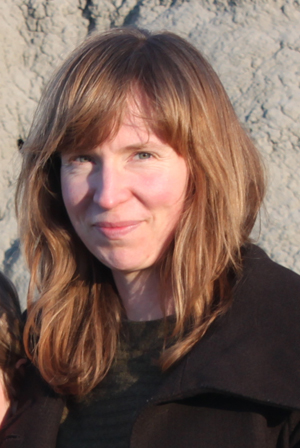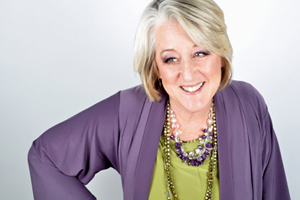Against the Easy Slide into Despair: Linda Rogers in Conversation with Laura Kraemer

Malahat advisory board member Linda Rogers talks with UVic 50th Anniversary Writing Contest for Fiction winner Laura Kraemer.
Congratulations, Laura, on winning the Malahat's UVic 50th Anniversary Writing Contest in fiction. Is this your first moment of glory and, given this affirmation, do you regard it as a stepping stone to a brilliant career in writing?
This is my first real prize and my first piece of published fiction, though the two times I got onto the Facts & Arguments page of The Globe felt pretty glorious too. But this kind of recognition has certainly functioned as a backstop against the easy slide into despair, an occupational hazard for all new writers. I now have something to wave in the face of the killer who lives in my head. If I fold it up and aim it just right, I might get her in the eye the next time she tells me to give up.
What made you a writer? Is it your secret life or a declared passion? What do you do when you are not writing?
Writing has always been one of my survival mechanisms--a way to bring order out of the everyday chaos of experience--but only in the last two years have I sought an audience and sort of come out of the closet. It really does feel like that--going public with an inborn need to know and be known in this way. It took a long time before I felt ready to accept the risk it involves. I'm still conflicted. The real rub is that the only reliable way I know I'm on to something is when I'd prefer to die rather than have the people I love read it.
There's a Zen proverb that says "one should seek enlightenment the way one whose hair is on fire seeks water," and it was while watching the Justin Bieber documentary, Never Say Never, that I first smelled smoke. It had the unmistakable stench of burning hair. I thought it unwise to yell Fire! in a crowded theatre, so I sat tight, my head growing hotter and hotter. The first essay landed in The Globe a few months later with a sweet hiss. Since then, the only peace I've found from thoughts about writing has been in the act itself.
And when I'm not writing, I operate a small child-production firm. My partner and I have three very exciting projects at various stages of development. And I listen to a lot of loud pop music--it's the centrifuge where I separate serum from cells, injecting the rich stuff back into my work. At least, that's the hope. Sometimes what appears rich at first is really just S.I.C (self-indulgent crap). It's a fine line.
If you could have it your way, where would this lead? Do you aspire to be the next Alice Munro or Mavis Gallant or do you see longer fiction or perhaps journalism beckoning?
I think all I want at this point is to have this lovely gift hog-tie my fears long enough to let me complete something else. This summer I started the first draft of a novel and it's kicking my ass daily. I have no idea what I'm doing. I can't even move a character from one side of the room to the other without making a god-awful mess. I'm so engaged in it my body has started to rebel. Getting news of the prize brought down the swelling in a chain of lymph nodes on the side of my neck, but I'm still clenching my teeth at night. This writing shit is not for sissies. If I thought much past the next workshop submission, I'd be sunk. And I understand the prospect of getting a book of literary fiction published today is right up there with intergalactic space travel, so I'm not holding my breath.
Most writers are insatiable book consumers. What do you like to read and who are your role models and mentors?
For my birthday two years ago, my mother bought me a subscription to The Sun Magazine. I have my world regularly rocked by the fearless, exquisite writing I find in its pages--the kind of writing that hunts you down and smokes you out of the hole you thought no one would ever find you in. "The Sweater" was my first crack at Sun-style writing--the kind of irony-free, lay-it-all-out-there stuff that I've steeped myself in for two years.
Miranda July's book No One Belongs Here More Than You is never far from reach. There are lines in "The Sweater" that I can point to and say, that's July's influence. Love Medicine by Louise Erdrich is another one of my sacred texts. Anne Enright's work (The Gathering, Yesterday's Weather) always makes me fantastically uncomfortable. An Absorbing Errand: How Artists and Craftsmen Make Their Way to Mastery by Janna Malamud Smith is my deep comfort when things get tough. Kinky Friedman says "find what you love and let it kill you." One day, the cat (whom I also love) will knock over the stack of books beside my bed and I'll be buried alive while I sleep.
Some people say the first novel is autobiographical. How about this story? Was there a "thing" you desired that would help you rise from normalcy and become The Girl? I think you have tapped something universal in this story, the desperate need to be loved and hope that there is some magic amulet that will help that along.
I'm still trying to shop my way to a new life, and J. Crew knows it. It's the human condition to fixate upon an external thing, tangible or not, and hope that once you possess it, you'll be complete. One element of this story is “emotional economics”: the things we do in order to get on with the sometimes difficult business of living. Lots of us are saddled with profound emotional needs and we have to fashion some pretty dodgy adaptations to get by, those "bittersweet distractions that dare not speak their names," to paraphrase a Radiohead lyric. The story is also about the ultimate failure of these distractions--of course, there are no substitutes for what we really need. It's a snapshot of a girl who's slowly figuring that out, the hard way. Is there any other?
I recently went to a high school reunion, where I was told that I had been envied because I was so together, maybe even a Rebecca. I was gobsmacked. No way. I was an outsider too. We all thought we were outsiders. I love the sub-text in your story that tells me Rebecca may also be a "tryhard," and "outsider wanting in." She may have been just as disillusioned by her sweater. Perhaps she too felt threatened sexually and the baggy sweater was her camouflage. The parallel stories were very alive for me as I read "The Sweater." This must have resonated with the final judge. What would you say to the judge who awarded you this honour?
Ha! So true. Isolation is a symptom of adolescence, no doubt some necessary developmental stage of identity-building. One of the few reliable markers of my maturity is how much more easily I identify with others as I get older. Any judgement I make cuts both ways. The line I draw between us and them gets moved further out all the time. And to D. W. Wilson, who judged this contest, I give a heartfelt thanks for giving my piece the sensitive reading that he did, for letting a pissed off seventeen-year-old with boundary issues speak to him from a tough spot.

Linda Rogers
* * * * * * * *
Read Laura Kraemer's winning short story here.









